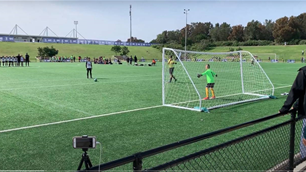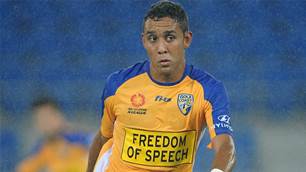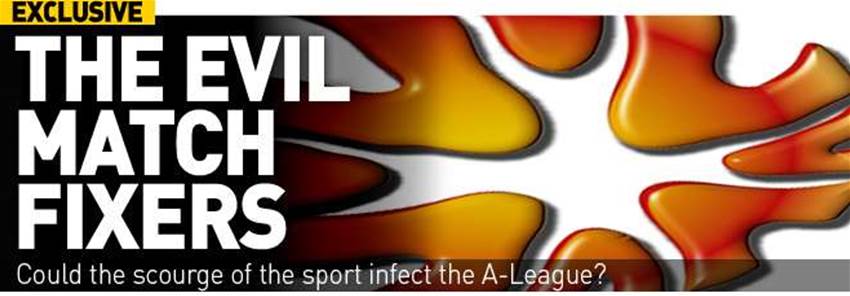VIOLENT gangsters, battered footballers, scared Socceroos and floodlight sabotage – we peer inside the murky world of international match-fixing where the bribery and corruption is more widespread than ever before. Best-selling author Neil Humphreys finds out more...
Former Socceroo Scott Ollerenshaw will never forget the phone call. The outspoken Australian striker, with 18 caps to his name, was becoming a cult hero in the Malaysian M-League. The trouble was he was doing plenty of talking off the pitch. The Sabah striker was disillusioned with the corruption eating the game from the inside out. He spoke out publicly against match-fixing. The response was immediate and threatening.
“During the infamous match-fixing round up all over Malaysia in ’95, I was very vocal in the press about how disgraceful it was,” recalls Ollerenshaw.
“I stressed how it wouldn’t happen in Australia. So, one night, I received a phone call telling me I was a visitor in the country and was advised to keep my mouth shut or else.”
Ollerenshaw, to his credit, continues to live and work in South-east Asia, running his successful Borneo sports holidays and football camp program, and still denounces the endemic corruption as a TV pundit for Astro Supersport in Malaysia.He was threatened, but escaped injury. Other expatriate footballers were not so lucky.
Assaults on Players
In 2000, a tough, non-compromising Yorkshireman was plying his trade in Singapore’s S-League. Some called Max Nicholson a “journeyman” footballer, but that was a lazy, hackneyed description. He was a box-to-box player, closer to Michael Carrick than David Batty. When Nicholson collected the ball, he always went forward, always progressed, always positive. That’s what the match fixers were afraid of. Walking out of his condo one balmy, humid morning on his way to a training session, Nicholson heard a commotion beside him. Several guys jumped out of one of Singapore’s longkangs (open drains) in front of the condo. They wore hockey masks and brandished baseball bats. Nicholson was assaulted in safe, sterile Singapore in broad daylight. He was not going to play for his side, Woodlands Wellington, that weekend. That had already been decided by the match fixers and illegal bookies, chiefly a Mr. Wilson Raj Perumal, but more on him later. Not surprisingly, Nicholson recovered from his injuries and joined his best mate in football, striker Stuart Young, who was having a successful spell up front for Wollongong Wolves in the old NSL. Being a rookie reporter at the time, I covered the Nicholson attack and subsequent match-fixing trial, which served as inspiration for my novel Match Fixer. Nicholson’s attack was a decade ago now, but match-fixing never went away – it got smarter and subtle.
Depressing Reality
Most Australian sportspeople, to their credit, dismiss match-fixing stories and tall tales of crime syndicates spanning the globe with their tentacles sucking the lifeblood from domestic leagues as the stuff of conspiracy theorists. How do you fix 22 players, a bench of substitutes, a referee and his wheezing, often myopic linesmen, two managers, a partisan crowd and the natural elements of wind, rain or dazzling sunshine blinding the cap-less goalkeeper at corners?
The short, depressing answer is – with surprisingly little difficulty. In the 1990s, matches in South-east Asian domestic leagues – such as Malaysia’s M-League or Singapore’s S-League – were fixed in the traditional, old-fashioned way.
Ollerenshaw was involved in fixed matches playing for Sabah in the M-League, but his healthy cynicism held sway initially. He refused to believe. It was un-Australian.
“My first experience with match-fixing came in my second year in Malaysia which was 1995. I had heard a few whispers, but dismissed them. Being an Aussie, it was inconceivable that team-mates could be involved,” he said.
“Then we played an away game against Malacca and half way through the second half, we were down 1-0. I won a penalty and my strike partner who was our penalty taker and playing in the Malaysia national team refused to take it. So I took it and scored.
“Suddenly, we were playing so defensive and my striker partner wouldn’t step over the halfway line. The game ended 1-1.”
The following day, Ollerenshaw accepted how deeply entrenched football corruption was in his adopted country.
“We caught the flight home and upon arriving, six of my team-mates were arrested at the airport, handcuffed and taken away,” he recalled.
“They were under investigation and their phone calls were recorded revealing that the game was fixed for Sabah to draw or lose the game.”
“I never trusted anyone in football from that day on.”
Tony Cottee, the former West Ham, Everton and England striker, was always acutely aware of the omnipresence of Asian match-fixing. The English football pundit had a brief spell in the Malaysian M-League with Selangor, between his West Ham and Leicester City stints in 1997 and was under no illusions.
“I heard about match-fixing in Malaysia before I joined Selangor via newspapers in the UK,” he said.
“There was only one game that I would have questioned in my time there. We were 2-0 up at half time to the bottom club in the league and managed to concede three goals in the second half – one an own goal! – to lose 2-3. It did make me wonder, especially as we were third in the league at the time.”
Cottee was always an unlikely target for match fixers. Too high profile and, yes, too well paid in the local context to be leaned on. Likewise, Ollerenshaw’s negative comments in the media never made him a candidate to be approached. But others who were soon got the message.
“A foreign player at Kedah in 1995 was approached (to fix a game) and rejected the offer,” Ollerenshaw said.
“He was soon scared to death when he was driving home from training one day and heard a hissing noise. He turned around to find a snake on his backseat.”
Continued on next page...
Addicted to the Fix
Gambling is in the Asian DNA, primarily in East Asia and South-East Asia. There is not so much a football culture in Asia as there is a football gambling culture and an overriding obsession that everything is “kelong” (the local vernacular for fixed, a Malay term, it means fishing traps, if you do not fix the traps properly, fish get through). Every Asian league is “kelong”, the A-League is “kelong”, La Liga, Serie A, the English Premier League, the Champions League, the World Cup; they’re all “kelong”. Of course, they’re not. But if a culture breeds on the principle that every sporting contest can be, or is, fixed, then notions of partisanship, favourite teams and fair play are often usurped.
There are only two sides in this football culture – winning and losing – and gambling-obsessed Asians want every “edge”, every piece of inside information, real or otherwise, to ensure they end up on the right side. From Singapore to Shanghai, if a football bet is lost, the reaction is always the same. The match was “kelong”. There is anger not because the match was perceived to be fixed, but because the bet was not placed on the supposedly fixed side. That’s the cultural distinction to make.
That’s why fellow “sports” journalists in Singapore would dash to the nearest Singapore Pools outlet before a game once they’d received word that the fix was in. I watched them place the bets. I watched them make a tidy sum as the goals reigned in the last 10 minutes of the game (the more goals scored, the better the odds, the easier to fix, a defender and a goalkeeper will do. Nine goals or more was always the jackpot; 9+ paid up to 50-1). I watched them wave their betting slip in celebration as games suddenly turned into 5-4 farces or 6-3 capitulations. And then I watched them write match reports with a straight face about the weary defence inevitably imploding in the dying moments of the game. That’s why Asian leagues are more susceptible to match-fixing. That’s why illegal Asian betting syndicates send representatives with suitcases stuffed with cash (US$100,000 usually does the trick) to overseas leagues from Bosnia to Bahrain. As Subhas Anandan, Singapore’s most high prolife criminal lawyer who has defended several match fixers over the years, once told me: “At any given time, there are always a couple of match fixers in the air, flying to fix a game somewhere.”
Meet the Match Fixer
Men like the inimitable Wilson Raj Perumal. The man is a Google search all by himself. Like the methods of match fixing, he has evolved and diversified with breathtaking audacity. At time of writing, the Singaporean was on the run for allegedly injuring a police officer, but recent reports suggested he'd been arrested in Finland. That's how far his links to global match-fixing allegedly reach.
In 1995, when South-East Asia finally went after the match-fixing syndicates in a series of operations that Ollerenshaw alluded to, Wilson Raj was jailed in Singapore for a year for giving $3000 to a football team captain to lose a match in September 1994. Turned out he was just warming up.
In 1999, he was found guilty of bribing a football referee. A year later, he was linked to the Nicholson assault. But these were old school match-fixing methods. The game was changing rapidly. Rupert Murdoch’s TV revenues were transforming the beautiful game into a global, billion-dollar industry. Online gambling websites were doing the same for illegal bookies. The 2002 World Cup generated around $500 million in betting revenue for the Government-owned Singapore Pools. That’s a one-month tournament in a country of only four million. And that’s the legal betting revenue. Conservative estimates suggest only 20-30 per cent of all bets placed in a country like Singapore are legal. The other 70-80 per cent go to the illegal bookies, who give better odds and a longer line of credit. You do the maths. The days of bribing referees for a domestic fixture were ending. Match-fixing was going global and getting creative.
On September 2010, a largely meaningless friendly between host Bahrain and Togo was played. Togo lost 3-0. There were rumours that the game was fixed. Out of nowhere, Singapore’s “kelong king”, Wilson Raj popped up on the radar. His alleged involvement is nothing short of extraordinary - the Togo team was made up entirely of imposters. Wilson Raj, posing as an accredited agent and match organiser, allegedly arranged for a “fake” Togo team to take on Bahrain, making the not unreasonable assumption that no-one in Bahrain could tell a genuine Togo player from a fake one. Why bother with the outdated, unreliable methods of bribing the goalkeeper or the ref when you can fix an entire squad? The elaborate scam almost worked – except a legitimate official from the Togolese Football Federation happened to be at the match.
The Bahrain Football Association launched an immediate investigation and former Togo coach Bana Tchanile was handed a three-year ban for taking the team of imposters to Bahrain. Any journalist or fan who has laboured through the tedious process of getting a ticket, pass or visa to an international football fixture would immediately recognise that Tchanile could not be the only culprit. Passport details, travel documents and visa applications all had to be exchanged between Togo and Bahrain. “Incentives” would have been needed within the football associations to expedite the process.
According to an industrious investigative reporter in Singapore, who has followed the case closely and spoke on condition of anonymity, Wilson Raj placed heavy bets with football betting websites, with each one making between $500,000 and $700,000.
Match-fixing is an expensive proposition. There are a lot of overheads. According to The New Paper in Singapore, Wilson Raj is backed by a wealthy Chinese Singaporean and supported by several lieutenants, including a Malaysian and an Indian Singaporean man. Their global match-fixing targets? Any national association where wages are low or paid irregularly. Wilson Raj started with smaller nations, according to The New Paper, because he was broke after being released from jail in 2006. In 2008, he was allegedly involved with fixing a match which involved the Sierra Leone Under-20 team. What is certain is that Malaysia beat Sierra Leone 4-0 in Malaysia in the Merdeka Tournament in October 2008. What is less certain is who actually organised the match. A source at the Football Association of Malaysia told The New Paper that Wilson Raj’s name was not registered with the company that organised the match, but he appeared to be calling the shots.
In July 2009, he was back in Malaysia with the Zimbabwe national team for two friendlies. But the Zimbabwe side appeared to be as genuine as the Togo side that popped up in Bahrain a year later. After “Zimbabwe” lost 4-0 and 1-0 to Malaysia, Malaysian newspaper The Malay Mail claimed the players were not the real deal. It gets better. Several media reports later said the players were in fact from a Zimbabwe premier league team called Monomotapa United.
After the scandal, Said Datuk Azzudin Ahmad, the FAM general secretary, said: “When we are told that this is their national team, we take their word for it. We do not question it because that would be questioning their integrity.” But it’s interesting to note that no African side has been invited to play in Malaysia this year. And FAM have now joined the Zimbabwe Football Association (Zifa), the Togo Football Federation and, of course, the Singapore Police Force, all wanting to have a word with the missing Wilson Raj.
Finally, in October 2010, FIFA intervened, calling on Zifa to take urgent action after an internal probe by Zifa concluded that national team players were paid to lose matches by an Asian betting syndicate in December 2009. Zimbabwe lost 3-0 to Thailand and 6-0 to Syria. Incidentally, at exactly the same time, two Singaporean “businessmen” were arrested in Syria on allegations of match-fixing. They were imprisoned for a short period and then released, following rumours of torture and bribery. According to sources, the “businessmen” are back in Singapore and both “active” again.
Continued on next page...
Going For Europe
Wilson Raj has generally targeted the lower leagues and poorer football associations for obvious reasons. No one is seriously going to try and bribe Wayne Rooney with a paltry half a week’s wages. But if the players can’t always be fixed, the infrastructure can. In November 1997, West Ham were at home to Crystal Palace when the match was abandoned when the floodlights went out with the score at 2-2. In December 1998, the lights went out at Selhurst Park when Wimbledon were playing at home to Arsenal. The score was 0-0. In August 1999, Hong Kong-born Wai Yuen Liu, 38, the London-based match fixer for an Asian syndicate, was found guilty of plotting to sabotage a match between Charlton Athletic and Liverpool in February 1999. His syndicate was involved in all three games. The first two allegedly earned the Asian crime gang around 60 million pounds. The lights only stayed on at The Valley because Liu was caught red-handed at the ground trying to plant an electrical device to sabotage the flood lighting.
Subhas Anandan has known a member of the syndicate since childhood and refers to him in his autobiography as “Pal”. He told me that syndicates agree that if a “force of nature” leads to a game’s abandonment then the score at the time of the postponement stands. When the syndicates are happy with a certain scoreline, they literally pull the plug.
In recent years, Asian syndicates and a rising number of crime gangs from Eastern Europe are brazenly targeting Europe. On 20 November 2009, police and UEFA officials called a press conference in Germany to announce allegations of match-fixing on a massive scale. Seventeen people were arrested in coordinated raids as part of an investigation into a match-fixing ring which affected up to 200 games, including some in the Bundesliga, the Champions League and Europa League pre-qualifying rounds. The fixed games still allegedly involved lesser teams, but the competitions were getting bigger though. Raids were carried out in Germany and Switzerland and there were reports of gangs with Croatian links supplying sedatives to team doctors and hotel cooks in an attempt to drug players.
Is the A-League Immune?
FIFA continues its war on match-fixing, which is proving to be about as successful as the United States’ war on drugs. There will be further raids in the future. There will be further arrests. Domestic leagues across Asia do acknowledge the issue and Singapore’s S-League makes its players take polygraph lie-detector tests.
Match-fixing within Asia’s domestic league is probably not as rife as it was during its heyday in the early 1990s. But it’s difficult to say whether that’s due to an official crackdown or because crime syndicates have benefited from the explosion of cable TV and online gambling and gone global. Why waste time with a Malaysian M-League match when you can pool funds in a joint venture and go for a lesser light in the European Champions League?
The international reach of Asian - and increasingly Eastern European – match-fixing operations raises the obvious question. Is Australia immune? Can A-League matches be nobbled? Certainly, the A-League fits the traditional criterion and ticks the right boxes for a match-fixer. It’s a new fledgling league that flies largely beneath the radar of mainstream media because of the dominance of the other football codes domestically. Wages are also lower than the major European leagues and A-League teams are regularly involved with the Asian Champions League, which includes nations with a patchy record on corruption.
The checklist might be there, but the culture certainly isn’t. “It’s un-Australian,” Ollerenshaw says simply.
There are no documented cases of Asian crime syndicates extending their operations into the A-League, but no league is invulnerable and there are lessons to be learned from Asia. Pay wages; on time and regularly too.
Last year's financial problems at Newcastle Jets demonstrated that clubs walk a tightrope in any new sports league. There is no evidence to suggest any wrongdoing on the part of the Jets, but match fixers thrive on a player’s economic insecurity.
“You can never say never,” Ollerenshaw admitted.
“However, isolated cases are always possible. If players have financial problems, they may be tempted to partake in a fix.”
Australian football’s unblemished track record is a reason to be proud, but certainly not smug or complacent. The A-League may be here to stay. But so are the match fixers.
Neil Humphreys is the best-selling author of Match Fixer and spent a decade as a football writer in Singapore. His new book, Premier Leech: A Story of Greed, Sleaze and Corruption, is out now.
This article appeared in the June 2011 issue of Australian FourFourTwo magazine. To buy back copies of this issue call 03-8317-8121 with a credit card to hand.
The current edition of Australian FourFourTwo has just gone on sale in newsagent across the country, or you can subscribe here
PFA chief executive Brendan Schwab on corruption reaching the A-League...
“Corruption has been a long-standing issue, not just in Asia but also in Europe, and there are a number of factors as to whether it will reach Australia. Our players are well educated and they know they simply can’t bet on football at all.
The major professional sports in Australia have met with Federal Minister for Sport, Mark Arbib, to discuss a national approach to anti-betting. All the players associations have been represented in that dialogue and there is no doubt that Australian sport is taking the risk very seriously.
From a PFA point of view, we get nervous when it comes to being seen to punish the offending players. We have to manage the relationship between being seen as punishing and actually going to the sources. We know from our experiences in Eastern Europe that organised criminal elements in Asian football are very clever and can negotiate their way into dealing with players. The players therefore need to not only be regulated, but also protected.
While Australians have always been great gamblers, we don’t have a history of match fixing. It’s wrong to say that it’s a cultural thing, it is more commercial and criminal.
In the late ’90s, we represented an Aussie player in Singapore named Mirko Jurilj who received a lifetime ban after being convicted by Singaporean authorities for match fixing. The Singaporean legal processes were inadequate and the player did not receive a fair hearing. He served time in jail, but we managed to get his lifetime footballing ban from FIFA revoked as they shared the same concerns we did.
It is also simplistic to say that the A-League is a new league that does not have a wide media exposure and low wages, hence it is susceptible to corruption. That’s certainly not the case. We’re lucky that football has a very good record of professionalism on and off the field.
Players go into fully professional environments where even if the rate of remuneration is somewhat less than their European and Asian counterparts, it is still very competitive with regards to Australian sport.”
Related Articles

Fresh talent flock to ambitious A-League outfit's pro pathway

Why A-League 20/21 is crucial for Olyroos’ medal hopes













